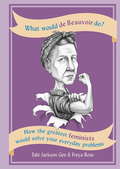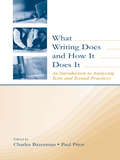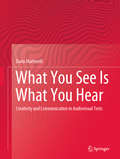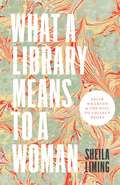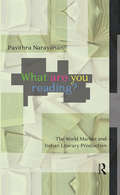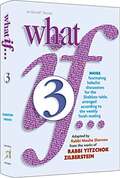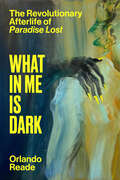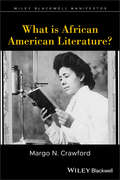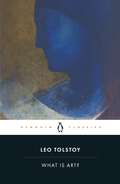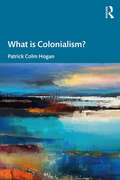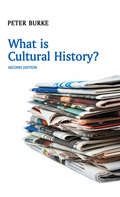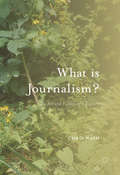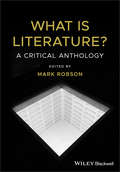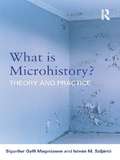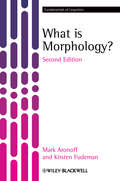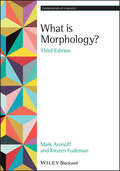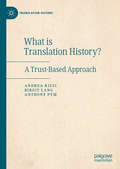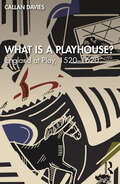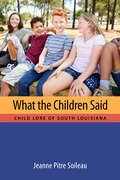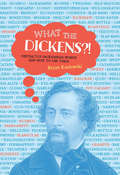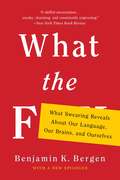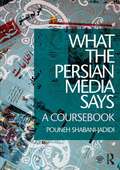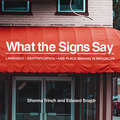- Table View
- List View
What Would de Beauvoir Do: How the greatest feminists would solve your everyday problems
by Tabi Jackson Gee Freya RoseHave you ever wondered what Andrea Dworkin would have to say about your Brazilian wax? Or what Mary Wollstonecraft would think about the 'fairy-tale' weddings you're constantly being invited to? Ever thought about what advice Naomi Wolf would give you on your Tinder profile?Using 40 everyday questions and problems as springboards for exploring the theories and concepts of the greatest feminist theorists of all time, What Would de Beauvoir Do? tackles all the important issues in your life through a feminist lens.From bell hooks to Betty Friedan, Shulamith Firestone to Susie Orbach, let the most influential feminists in history answer all your everyday questions, and in doing so shed light on even the most complex feminist theories.
What Writing Does and How It Does It: An Introduction to Analyzing Texts and Textual Practices
by Paul Prior Charles BazermanIn What Writing Does and How It Does It, editors Charles Bazerman and Paul Prior offer a sophisticated introduction to methods for understanding, studying, and analyzing texts and writing practices. This volume addresses a variety of approaches to analyzing texts, and considers the processes of writing, exploring textual practices and their contexts, and examining what texts do and how texts mean rather than what they mean. Included are traditional modes of analysis (rhetorical, literary, linguistic), as well as newer modes, such as text and talk, genre and activity analysis, and intertextual analysis. The chapters have been developed to provide answers to a specified set of questions, with each one offering:*a preview of the chapter's content and purpose; *an introduction to basic concepts, referring to key theoretical and research studies in the area;*details on the types of data and questions for which the analysis is best used; *examples from a wide-ranging group of texts, including educational materials, student writing, published literature, and online and electronic media; *one or more applied analyses, with a clear statement of procedures for analysis and illustrations of a particular sample of data; and*a brief summary, suggestions for additional readings, and a set of activities. The side-by-side comparison of methods allows the reader to see the multi-dimensionality of writing, facilitating selection of the best method for a particular research question. The volume contributors are experts from linguistics, communication studies, rhetoric, literary analysis, document design, sociolinguistics, education, ethnography, and cultural psychology, and each utilizes a specific mode of text analysis. With its broad range of methodological examples, What Writing Does and How It Does It is a unique and invaluable resource for advanced undergraduate and graduate students and for researchers in education, composition, ESL and applied linguistics, communication, L1 and L2 learning, print media, and electronic media. It will also be useful in all social sciences and humanities that place importance on texts and textual practices, such as English, writing, and rhetoric.
What You See Is What You Hear: Creativity and Communication in Audiovisual Texts
by Dario MartinelliWhat You See Is What You Hear develops a unique model of analysis that helps students and advanced scholars alike to look at audiovisual texts from a fresh perspective. Adopting an engaging writing style, the author draws an accessible picture of the field, offering several analytical tools, historical background, and numerous case studies. Divided into five main sections, the monograph covers problems of definitions, history, and most of all analysis. The first part raises the main problems related to audiovisuality, including taxonomical and historical questions. The second part provides the bases for the understanding of audiovisual creative communication as a whole, introducing a novel theoretical model for its analysis. The next three part focus elaborate on the model in all its constituents and with plenty of case studies taken from the field of cinema, TV, music videos, advertising and other forms of audiovisuality. Methodologically, the book is informed by different paradigms of film and media studies, multimodality studies, structuralism, narratology, “auteur theory” in the broad sense, communication studies, semiotics, and the so-called “Numanities.” What You See Is What You Hear enables readers to better understand how to analyze the structure and content of diverse audiovisual texts, to discuss their different idioms, and to approach them with curiosity and critical spirit.
What a Library Means to a Woman: Edith Wharton and the Will to Collect Books
by Sheila LimingExamining the personal library and the making of self When writer Edith Wharton died in 1937, without any children, her library of more than five thousand volumes was divided and subsequently sold. Decades later, it was reassembled and returned to The Mount, her historic Massachusetts estate. What a Library Means to a Woman examines personal libraries as technologies of self-creation in modern America, focusing on Wharton and her remarkable collection of books.Sheila Liming explores the connection between libraries and self-making in late nineteenth- and early twentieth-century American culture, from the 1860s to the 1930s. She tells the story of Wharton&’s library in concert with Wharton scholarship and treatises from this era concerning the wider fields of book history, material and print culture, and the histories (and pathologies) of collecting. Liming&’s study blends literary and historical analysis while engaging with modern discussions about gender, inheritance, and hoarding. It offers a review of the many meanings of a library collection, while reading one specific collection in light of its owner&’s literary celebrity.What a Library Means to a Woman was born from Liming&’s ongoing work digitizing the Wharton library collection. It ultimately argues for a multifaceted understanding of authorship by linking Wharton&’s literary persona to her library, which was, as she saw it, the site of her self-making.
What are you Reading?: The World Market and Indian Literary Production
by Pavithra NarayananThis book offers a material critique on various aspects of Indian literary production and its reception by its audiences. Taking a historical and contemporary lineage into account, the author variously discusses the social, political, and economic factors that impact upon and determine choices in the publishing world. Examining the constructions of the archive of postcolonial works by Indian writers in relation to nationalist histories, language wars, and the relationship between economic policies and literature, the book forcefully argues that why we read what we read is more than coincidental. Placing the rights of minoritized and disadvantaged communities at the heart of the analysis of India’s decolonization and industrial projects, the book attempts to address not just inequalities in the publishing world, but also social inequities engendered by global capitalism. Offering a critique of academics who act as cultural gatekeepers of intellectual production, the book finally underscores the disconnect between the academic theory and practice of scholars of postcolonial studies who argue against inequality and marginalization while simultaneously supporting hegemonic academic practices. This book will be of interest to scholars of development studies, cultural studies, literature, postcolonial studies, economics, and those studying globalization, as well as the interested lay reader.
What if…?: More Fascinating Halachic Discussions for the Shabbos Table, Arranged According to the Weekly Torah Reading (What If…? #3)
by Moshe SherrowWhat if... ...a man needs to take a sleep test, but it will mean missing zeman Kriyas Shema? ...a candy thrown during an aufruf misses the chasan and breaks the gabbai's glasses? ...someone takes out his neighbor's garbage, but there was jewelry in the trash bag? <P><p>Tens of thousands of readers have made the What If? series a staple at their Shabbos table. Based on the popular Hebrew-language series Chashukei Chemed, written by noted rav and posek, Rav Yitzchok Zilberstein shlita, and translated and arranged in the order of the weekly parashah by Rabbi Moshe Sherrow, What If? includes hundreds of real-life halachic questions, each accompanied by a brief, practical scenario to illustrate the case, and an analysis that is understandable and easy to follow. <p><p>What If? 3 continues the stimulating Torah conversation, with more fascinating halachic questions and scenarios. What If... ...your Shabbos table conversation flowed as freely as fine wine? ...your children sat at Shabbos dinner, engaged and enthusiastic by the Torah discussion? ...your guests enjoyed the conversation as much—and even more—as they enjoyed your chulent? What If? 3—The Torah conversation continues!
What in Me Is Dark: The Revolutionary Afterlife of Paradise Lost
by Orlando ReadeA highly original hybrid of literary criticism and political history, telling of the enduring, surprising and ever-evolving relevance of Milton&’s epic poem through the scandalous life of its creator and the revolutionary lives that were influenced by it.What in Me Is Dark tells the unlikely story of how Milton&’s epic poem came to haunt political struggles over the past four centuries, including the many different, unexpected, often contradictory ways in which it has been read, interpreted, and appropriated through time and across the world, and to revolutionary ends. The book focuses on twelve readers—including Malcolm X, Thomas Jefferson, George Eliot, Hannah Arendt, and C.L.R James—whose lives demonstrate extraordinary and disturbing influence on the modern age.Drawing from his own experiences teaching Paradise Lost in New Jersey prisons, English scholar Orlando Reade deftly investigates how the poem was read by people embedded in struggles against tyranny, slavery, colonialism, gender inequality, and capitalist exploitation. It is experimental nonfiction at its finest; rich literary analysis and social, cultural and political history are woven together to make a clarifying case for the undeniable impact of the poem.
What is African American Literature? (Wiley-Blackwell Manifestos)
by Margo N. CrawfordAfter Kenneth W. Warren's What Was African American Literature?, Margo N. Crawford delivers What is African American Literature? The idea of African American literature may be much more than literature written by authors who identify as "Black". What is African American Literature? focuses on feeling as form in order to show that African American literature is an archive of feelings, a tradition of the tension between uncontainable black affect and rigid historical structure. Margo N. Crawford argues that textual production of affect (such as blush, vibration, shiver, twitch, and wink) reveals that African American literature keeps reimagining a black collective nervous system. Crawford foregrounds the "idea" of African American literature and uncovers the "black feeling world" co-created by writers and readers. Rejecting the notion that there are no formal lines separating African American literature and a broader American literary tradition, Crawford contends that the distinguishing feature of African American literature is a "moodscape" that is as stable as electricity. Presenting a fresh perspective on the affective atmosphere of African American literature, this compelling text frames central questions around the "idea" of African American literature, shows the limits of historicism in explaining the mood of African American literature and addresses textual production in the creation of the African American literary tradition. Part of the acclaimed Wiley Blackwell Manifestos series, What is African American Literature? is a significant addition to scholarship in the field. Professors and students of American literature, African American literature, and Black Studies will find this book an invaluable source of fresh perspectives and new insights on America's black literary tradition.
What is Art? (Bloomsbury Revelations Ser.)
by Leo TolstoyDuring his decades of world fame as a novelist, Tolstoy also wrote prolifically in a series of essays and polemics on issues of morality, social justice and religion. These works culminated in What is Art?, published in 1898. Impassioned and iconoclastic, this powerfully influential work both criticizes the elitist nature of art in nineteenth-century Western society, and rejects the idea that its sole purpose should be the creation of beauty. The works of Dante, Michelangelo, Shakespeare, Beethoven, Baudelaire and Wagner are all vigorously condemned, as Tolstoy explores what he believes to be the spiritual role of the artist - arguing that true art must work with religion and science as a force for the advancement of mankind.
What is Colonialism?
by Patrick Colm HoganWhat is Colonialism? develops a clear and rigorous account of what colonialism is and how it works. It draws on and synthesizes recent work in cognitive science, affective science, and social psychology, along with Marxism and related forms of analysis. Hogan begins with some fundamental conceptual distinctions, such as the degree to which a group shares beliefs, dispositions, and skills versus the degree to which they share identification with a category. Building on these distinctions, he defines colonialism in terms of political, economic, and cultural autonomy, clarifying the nature of culture and autonomy particularly. He goes on to articulate an invaluable systematic account of the varieties of colonialism. The final chapters outline the motives of imperialists, differentiating these from their ideological rationalizations, and sketching the harms caused by colonialism. The book concludes by considering when, or if, one can achieve a genuinely postcolonial condition. Hogan illustrates these analyses by examining influential literary works—by European writers (such as Joseph Conrad) and by non-Europeans (such as Athol Fugard, Kamala Markandaya, and Wole Soyinka). This accessible and informative volume is the ideal resource for students and scholars interested in colonialism and empire.
What is Cultural History?
by Peter BurkeWhat is Cultural History? has established itself as an essential guide to what cultural historians do and how they do it. Now fully updated in its second edition, leading historian Peter Burke offers afresh his accessible guide to the past, present and future of cultural history, as it has been practised not only in the English-speaking world, but also in Continental Europe, Asia, South America and elsewhere. Burke begins by providing a discussion of the 'classic' phase of cultural history, associated with Jacob Burckhardt and Johan Huizinga, and of the Marxist reaction, from Frederick Antal to Edward Thompson. He then charts the rise of cultural history in more recent times, concentrating on the work of the last generation, often described as the 'New Cultural History'. He places cultural history in its own cultural context, noting links between new approaches to historical thought and writing and the rise of feminism, postcolonial studies and an everyday discourse in which the idea of culture plays an increasingly important part. The new edition also surveys the very latest developments in the field and considers the directions cultural history may be taking in the twenty-first century. The second edition of What is Cultural History? will continue to be an essential textbook for all students of history as well as those taking courses in cultural, anthropological and literary studies.
What is Journalism?
by Chris NashThis book argues that journalism should treat itself as an academic discipline on a par with history, geography and sociology, and as an art form in its own right. Time, space, social relations and imagination are intrinsic to journalism. Chris Nash takes the major flaws attributed to journalism by its critics--a crude empiricism driven by an un-reflexive 'news sense'; a narrow focus on a de-contextualised, transient present; and a too intimate familiarity with powerful sources--and treats them as methodological challenges. Drawing on the conceptual frameworks of Pierre Bourdieu, David Harvey, Henri Lefebvre, Michel-Rolph Trouillot and Gaye Tuchman, he explores the ways in which rigorous journalism practice can be theorised to meet these challenges. The argument proceeds through detailed case studies of work by two leading iconoclasts--the artist Hans Haacke and the 20th century journalist I. F. Stone. This deeply provocative and original study concludes that the academic understanding of journalism is fifty years behind its practice, and that it is long past time for scholars and practitioners to think about journalism as a disciplinary research practice. Drawing on an award-winning professional career and over three decades teaching journalism practice and theory, Chris Nash makes these ideas accessible to a broad readership among scholars, graduate students and thoughtful journalists looking for ways to expand the intellectual range of their work.
What is Literature?: A Critical Anthology
by Mark RobsonAn essential guide to understanding literary theory and criticism in the European tradition What is Literature? A Critical Anthology explores the most fundamental question in literary studies. ‘What is literature?’ is the name of a problem that emerges with the idea of literature in European modernity. This volume offers a cross-section of modern literary theory and reflects on the history of thinking about literature as a specific form. What is Literature? reveals how ideas of the literary draw on the foundations of Western thought in ancient Greece and Rome, charting the emergence of modern literature in the eighteenth century, and including selections from the present state of the art. The anthology includes the work of leading writers and critics of the last two thousand years including Plato, Henry James, Virginia Woolf, Edward Said, Gayatri Chakravorty Spivak, Jacques Rancière, and many others. The book is an insightful examination of the nature of literature, its meanings and values, functions and forms, provocations and mysteries. What is Literature? brings together in one volume influential and intriguing essays that show our enduring fascination with the idea of literature. This important guide: Contains a broad selection of the most significant texts on the topic of literature Includes leading writers from ancient times to the most recent thinkers on literature and criticism Encourages readers to reflect on the varied meanings of “literature” What is Literature? A Critical Anthology is a unique collection of texts that will appeal to every student and scholar of literature and literary criticism in the European tradition.
What is Microhistory?: Theory and Practice
by Sigurður Gylfi Magnússon István M. SzijártóThis unique and detailed analysis provides the first accessible and comprehensive introduction to the origins, development, methodology of microhistory – one of the most significant innovations in historical scholarship to have emerged in the last few decades. The introduction guides the reader through the best-known example of microstoria, The Cheese and the Worms by Carlo Ginzburg, and explains the benefits of studying an event, place or person in microscopic detail. In Part I, István M. Szijártó examines the historiography of microhistory in the Italian, French, Germanic and the Anglo-Saxon traditions, shedding light on the roots of microhistory and asking where it is headed. In Part II, Sigurður Gylfi Magnússon uses a carefully selected case study to show the important difference between the disciplines of macro- and microhistory and to offer practical instructions for those historians wishing to undertake micro-level analysis. These parts are tied together by a Postscript in which the status of microhistory within contemporary historiography is examined and its possibilities for the future evaluated. What is Microhistory? surveys the significant characteristics shared by large groups of microhistorians, and how these have now established an acknowledged place within any general discussion of the theory and methodology of history as an academic discipline.
What is Morphology? (Fundamentals of Linguistics #8)
by Mark Aronoff Kirsten FudemanWhat is Morphology? is a concise and critical introduction to the central ideas of morphology, which has been revised and expanded to include additional material on morphological productivity and the mental lexicon, experimental and computational methods, and new teaching material. Introduces the fundamental aspects of morphology to students with minimal background in linguistics Includes additional material on morphological productivity and the mental lexicon, and experimental and computational methods Features new and revised exercises as well as suggestions for further reading at the end of each chapter Equips students with the skills to analyze a wide breadth of classic morphological issues through engaging examples Uses cross-linguistic data throughout to illustrate concepts, specifically referencing Kujamaat Joola, a Senegalese language Includes a new answer key, available for instructors online at http://www.wiley.com/go/aronoff
What is Morphology? (Fundamentals of Linguistics #9)
by Mark Aronoff Kirsten FudemanProvides a critical introduction to the central ideas and perennial problems of morphology, fully revised and updated in a new edition What is Morphology? is a concise, student-friendly introduction to the fundamentals of contemporary morphological theory and practice. Requiring only a basic knowledge of linguistics, this popular textbook describes morphological phenomena and their interactions with phonology, syntax, and semantics while familiarizing students with the importance of linguistic morphology as a subject of research. Each chapter contains engaging examples and student-friendly explanations to support the development of the skills necessary to analyze a wealth of classic morphological problems. The third edition is fully updated to reflect the current state of the field, featuring a new chapter on morphology&’s intersections with typology and computational linguistics. Expanded coverage of morphological productivity and processing is supported by additional exercises, examples, and further reading suggestions. Thoroughly revised chapters cover essential topics including morphemes, the lexicon, phonology, inflection, syncretism, and derived lexemes. This accessible textbook: Introduces fundamental phenomena with a descriptive theme and minimal theory Uses cross-linguistic data to explain and clarify new concepts Provides new and revised chapters written by prominent experts in their respective areas Includes answers to all exercises via a companion instructor&’s websiteThe latest edition of What is Morphology? remains the ideal textbook for undergraduate and graduate linguistics students, researchers and scholars unfamiliar with linguistic morphology, and professionals involved in industrial applications of linguistics such as speech recognition, natural language understanding, machine translation, text-to-speech, and natural language generation.
What is Translation History?: A Trust-Based Approach (Translation History)
by Anthony Pym Birgit Lang Andrea RizziThis book presents a dynamic history of the ways in which translators are trusted and distrusted. Working from this premise, the authors develop an approach to translation that speaks to historians of literature, language, culture, society, science, translation and interpreting. By examining theories of trust from sociological, philosophical, and historical studies, and with reference to interdisciplinarity, the authors outline a methodology for approaching translation history and intercultural mediation from three discrete, concurrent perspectives on trust and translation: the interpersonal, the institutional and the regime-enacted. This book will be of particular interest to students and scholars of translation studies, as well as historians working on mediation and cultural transfer.
What is a Playhouse?: England at Play, 1520–1620
by Callan DaviesThis book offers an accessible introduction to England’s sixteenth- and early seventeenth-century playing industry and a fresh account of the architecture, multiple uses, communities, crowds, and proprietors of playhouses. It builds on recent scholarship and new documentary and archaeological discoveries to answer the questions: what did playhouses do, what did they look like, and how did they function? The book will accordingly introduce readers to a rich and exciting spectrum of "play" and playhouses, not only in London but also around England. The detailed but wide-ranging case studies examined here go beyond staged drama to explore early modern sport, gambling, music, drinking, and animal baiting; they recover the crucial influence of female playhouse owners and managers; and they recognise rich provincial performance cultures as well as the burgeoning of London’s theatre industry. This book will have wide appeal with readers across Shakespeare, early modern performance studies, theatre history, and social history.
What the Children Said: Child Lore of South Louisiana (Cultures of Childhood)
by Jeanne Pitre SoileauWinner of the 2022 Opie PrizeJeanne Pitre Soileau vividly presents children’s voices in What the Children Said: Child Lore of South Louisiana. Including over six hundred handclaps, chants, jokes, jump-rope rhymes, cheers, taunts, and teases, this book takes the reader through a fifty-year history of child speech as it has influenced children’s lives.What the Children Said affirms that children's play in south Louisiana is acquired along a network of summer camps, schoolyards, church gatherings, and sleepovers with friends. When children travel, they obtain new games and rhymes and bring them home. The volume also reveals, in the words of the children themselves, how young people deal with racism and sexism. The children argue and outshout one another, policing their own conversations, stating their own prejudices, and vying with one another for dominion. The first transcript in the book tracks a conversation among three related boys and shows that racism is part of the family interchange. Among second-grade boys and girls at a Catholic school, another transcript presents numerous examples in which boys use insults to dominate a conversation with girls, and girls use giggles and sly comebacks to counter this aggression.Though collected in the areas of New Orleans, Baton Rouge, and Lafayette, Louisiana, this volume shows how south Louisiana child lore is connected to other English-speaking places: England, Scotland, Ireland, Australia, and New Zealand, as well as the rest of the United States.
What the Dickens?!: Distinctly Dickensian Words and How to Use Them
by Bryan KozlowskiGRAB A BUMPER, FORGET YOUR FANTEEGS, AND ROAM AT A FOOT-PACE THROUGH THE TWISTY ALLEYWAYS OF THE VICTORIAN VERNACULAR!What larks! Dive into the world of literature's ultimate wordsmith, Charles Dickens, in this literary romp through his finest quips, barbs, and turns of phrase.Featuring 200 of Dickens' best-loved words, drawn from his fifteen novels and hundreds of short stories, What the Dickens?! is full of period-appropriate definitions, pithy commentary, and charming illustrations. Perfect for word nerds and book lovers of all ages, this volume will have you dragging your friends to the hippo-comedietta and bonneting your anti-Pickwickian adversaries like a proper Victorian in no time!
What the F: What Swearing Reveals About Our Language, Our Brains, And Ourselves
by Benjamin K. BergenIt may be starred, beeped, and censored--yet profanity is so appealing that we can't stop using it. In the funniest, clearest study to date, Benjamin Bergen explains why, and what that tells us about our language and brains.Nearly everyone swears-whether it's over a few too many drinks, in reaction to a stubbed toe, or in flagrante delicto. And yet, we sit idly by as words are banned from television and censored in books. We insist that people excise profanity from their vocabularies and we punish children for yelling the very same dirty words that we'll mutter in relief seconds after they fall asleep. Swearing, it seems, is an intimate part of us that we have decided to selectively deny.That's a damn shame. Swearing is useful. It can be funny, cathartic, or emotionally arousing. As linguist and cognitive scientist Benjamin K. Bergen shows us, it also opens a new window onto how our brains process language and why languages vary around the world and over time.In this groundbreaking yet ebullient romp through the linguistic muck, Bergen answers intriguing questions: How can patients left otherwise speechless after a stroke still shout Goddamn! when they get upset? When did a cock grow to be more than merely a rooster? Why is crap vulgar when poo is just childish? Do slurs make you treat people differently? Why is the first word that Samoan children say not mommy but eat shit? And why do we extend a middle finger to flip someone the bird?Smart as hell and funny as fuck, What the F is mandatory reading for anyone who wants to know how and why we swear.
What the People Know: Freedom and the Press
by Richard ReevesDiscusses the press and how it does and doesn't work and what needs to happen to improve things.
What the Persian Media says: A Coursebook
by Pouneh Shabani-JadidiWhat the Persian Media Says: A Coursebook is a comprehensive and stimulating course for intermediate to advanced students of Persian. Presenting many exercises based on authentic Persian newspaper texts, the course thoroughly introduces students to the language of the news in Iran. Real cultural content is featured throughout and there is a strong focus on enabling students to gain familiarity with day-to-day modern Persian discourse. Features include: A wide range of interesting and challenging exercises presented throughout, including activities designed to both test students’ knowledge in a classroom setting and to search online for further Persian news resources Usage of authentic texts from the Iranian media, written for native speakers, with sources including Ettel?’?t, Keyh?n, Sharq, E’tem?d, Ir?n, and Mardoms?l?ri Coverage of topics highly relevant to modern day Persian society, including the Arts, divorce, violence, problems of youth, unemployment, politics and economic issues, enabling cultural engagement and knowledge of complex expressions and idioms used in the media A comprehensive bilingual glossary of journalistic and non-journalistic terminology used in the newspaper texts, provided at the back of the book for easy access All the newspaper texts and their corresponding audio files available for free download at http://routledgetextbooks.com/textbooks/9781138825567/ What the Persian Media Says combines modern and more traditional techniques of language teaching. With all the newspaper texts and their corresponding audio files available for free on the Routledge website, students can read the texts in digital form and listen to the audio while working on exercises in the book, enabling full and exciting engagement with the course materials. Written by an experienced instructor, this will be an invaluable resource for intermediate to advanced undergraduate and postgraduate students of Persian. It can also be used by self-learners and by instructors and students on intensive courses and summer language programs.
What the Signs Say: Language, Gentrification, and Place-Making in Brooklyn
by Shonna Trinch Edward SnajdrAlthough we may not think we notice them, storefronts and their signage are meaningful, and the impact they have on people is significant. What the Signs Say argues that the public language of storefronts is a key component to the creation of the place known as Brooklyn, New York. Using a sample of more than two thousand storefronts and over a decade of ethnographic observation and interviews, the study charts two very different types of local Brooklyn retail signage. The unique and consistent features of many words, large lettering, and repetition that make up Old School signage both mark and produce an inclusive and open place. In contrast, the linguistic elements of New School signage, such as brevity and wordplay, signal not only the arrival of gentrification, but also the remaking of Brooklyn as distinctive and exclusive. Shonna Trinch and Edward Snajdr, a sociolinguist and an anthropologist respectively, show how the beliefs and ideas that people take as truths about language and its speakers are deployed in these different sign types. They also present in-depth ethnographic case studies that reveal how gentrification and corporate redevelopment in Brooklyn are intimately connected to public communication, literacy practices, the transformation of motherhood and gender roles, notions of historical preservation, urban planning, and systems of privilege. Far from peripheral or irrelevant, shop signs say loud and clear that language displayed in public always matters.
What the Signs Say: Language, Gentrification, and Place-Making in Brooklyn
by Shonna Trinch Edward SnajdrAlthough we may not think we notice them, storefronts and their signage are meaningful, and the impact they have on people is significant. What the Signs Say argues that the public language of storefronts is a key component to the creation of the place known as Brooklyn, New York. Using a sample of more than two thousand storefronts and over a decade of ethnographic observation and interviews, the study charts two very different types of local Brooklyn retail signage. The unique and consistent features of many words, large lettering, and repetition that make up Old School signage both mark and produce an inclusive and open place. In contrast, the linguistic elements of New School signage, such as brevity and wordplay, signal not only the arrival of gentrification, but also the remaking of Brooklyn as distinctive and exclusive. Shonna Trinch and Edward Snajdr, a sociolinguist and an anthropologist respectively, show how the beliefs and ideas that people take as truths about language and its speakers are deployed in these different sign types. They also present in-depth ethnographic case studies that reveal how gentrification and corporate redevelopment in Brooklyn are intimately connected to public communication, literacy practices, the transformation of motherhood and gender roles, notions of historical preservation, urban planning, and systems of privilege. Far from peripheral or irrelevant, shop signs say loud and clear that language displayed in public always matters.
